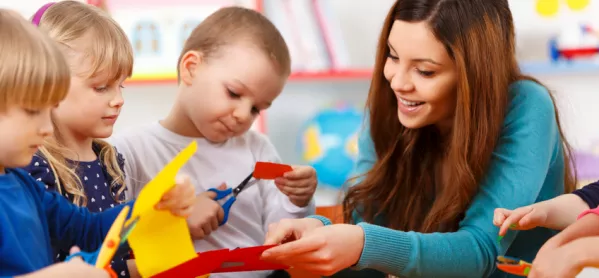
- Home
- What you need to know about the problems with ‘school readiness’
What you need to know about the problems with ‘school readiness’

Is your child “school-ready”?
Your answer will depend on what you think that term means. And from policymakers to parents, and teachers to pupils, everyone seems to have a different view.
“There is no clear definition about what school readiness actually means. Therefore, it has been left open to interpretation,” explains Dr Louise Kay, who researches EYFS practice at the University of Sheffield School of Education. On this week’s Tes Podagogy podcast, she talks at length about the problems with the school-readiness concept and the way it is assessed by government.
School ready?
“Most assume school readiness applies to children who are starting Reception. Actually, the government look at it as the transition from Reception to Year 1,” she explains. “So in a short space of time you have two transitions - the institutional transition from home or pre-school/nursery into Reception, and then the curricula transition when children move from Reception into Year 1. Two very different skillsets are required for those two transitions.
“So when school readiness is blurred in definition and understanding between these two transitions, it is very problematic for teachers, parents and pupils. The media often confuse the two, and teachers do, too: when I talk about school readiness they logically assume I mean what children can do on entry into Reception.”
“School-ready” is actually a term used to describe those children who reach the “good level of development” by the end of EYFS. Kay talks at length about how flawed this measure can be.
Development goals
“‘Good level of development’ is very specific,” she explains. “At the end of Reception, the teacher will fill in the summative assessment of the EYFS profile and that assessment is reported to the government, and teachers are accountable to that. Children are said to have reached a good level of development if they have reached the Early Learning Goals in the three prime areas: physical development, communication and language, and personal social development, and two of the specific areas of learning: maths and literacy.
“So a child could effectively achieve all the early learning goals except for the most difficult, which is the writing one, and they are then measured as being not school-ready. That’s is very problematic. You are then sending children into Y1 in a deficit position as ‘emerging’, which does not actually tell you much about what that child can do.
“The children that do not reach the marker for school-ready tend to be those on free school meals, children with English as an additional language, children with SEND, summer-born children, and gypsy Roma children - so the children who are already marginalised within society are those that are not reaching those goals and are then classified as being not ready on entry to school.”
Set up to fail
For Kay, this sets up children negatively for their school experience and it is a highly ignorant measure of a child.
“We do need to recognise that when children enter Reception they bring with them a wealth of different experiences and there is huge differentiation in what they can and cannot do,” she says. “Those teachers only have a very short length of time to hit that good level of development. This objective ignores the complexity and the diversity of the children we are working with. Some of these children are still four years old when this assessment takes place. And the fact teachers have such a short space of time to get children to that good level of development is a real issue.”
In the podcast, Kay also discusses the way in which the pursuit of school readiness dictates pedagogy in a way that makes many EYFS teachers feel uncomfortable and she explains how it is sidelining creativity and play in this phase. She calls for a more flexible approach to formalised learning.
“Let’s look at children on an individual basis,” she says. “If children are ready to write and read, then, by all means, let’s start that process. The problem emerges when we are trying to teach a child phonics and to write a sentence when they cannot actually articulate a sentence yet. We should be focusing on getting those foundational skills in place before we move children on.”
The Early Years Teacher
She also discusses the problems with the Early Years Teacher (EYT) role.
“The issue with the EYT is that it is not equitable with QTS. They need a degree, Maths and English GCSE, to pass the skills test, the current standards for EYT are almost identical to QTS - but they are not equitable. So that has an impact on salary, professionalism, professional respect, career progression. EYT is often paid a lot less, yet the responsibility they have is huge.”
To listen to the podcast in full, search for “Tes the education podcast” on your podcast platform, or click the player below.
Register with Tes and you can read five free articles every month, plus you'll have access to our range of award-winning newsletters.
Keep reading for just £4.90 per month
You've reached your limit of free articles this month. Subscribe for £4.90 per month for three months and get:
- Unlimited access to all Tes magazine content
- Exclusive subscriber-only stories
- Award-winning email newsletters
You've reached your limit of free articles this month. Subscribe for £4.90 per month for three months and get:
- Unlimited access to all Tes magazine content
- Exclusive subscriber-only stories
- Award-winning email newsletters



